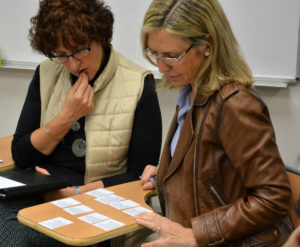Formative Assessment
In-house teacher training
This course is also available online
1 week
Course Length
Flexible
Lesson Days
15
Lessons
English
Language
B1
Minimum Level
Overview
Frequent, low-stakes ‘assessment’ has been shown to be a highly effective driver of students’ learning. The course will bring you to use formative assessment more often, and more effectively by improving teaching and students’ outcomes.
You will be introduced to a wide range of formative assessment strategies to experiment within your own classroom. This teacher training course will bring you to understand that when this process is incorporated into classroom practise, it provides information needed to adjust teaching and learning while they are still happening.
The formative assessment process will enable you to check your student’s understanding during their learning process that will guide you in making decisions about future learning instructions. After the course, you will be able to use the formative assessment process to gather evidence of your students learning.
Completing this course will help you:
- Use a wide range of formative assessment strategies
- Realtime analysis of information needed to adapt teaching and learning style while they are still happening.
- To process immediate student’s understanding
- To gather evidence of your students learning.
Who is the course for?
For teachers who want to acquire knowledge of processing real-time information in order to improve teaching in the class and evaluate and improve the students’ learning.
Course Sample programme
| Week 1 | Course Content |
| Day One | Understanding formative assessment strategies |
| Day Two | How to evaluate immediate student’s understanding |
| Day Three | Strategies and tools to gather real-time evidence of students’ learning |
| Day Four | The process incorporated into classroom practice |
| Day Five | Process Review and Feedback |
*Please note that the course content may be subject to change due to latest methodology trends updates. 1 lesson=45mins
Share This Class:
What people are saying



In-House Training
You might also be interested in these courses

Supporting pupils with Special Educational Needs and Disabilities
This course develops the skills of those involved in the education of pupils with Special Educational Needs and/or Disabilities (SEND) so that these children…

Higher Order Thinking
Developing Higher Order Thinking requires teachers to establish with their student a knowledge base of thinking skills, reasoning, critical thought, and problem-solving…

Scaffolding
With our workshop “Scaffolding” you will understand in more details on how to support second language learners by providing helpful hints to help students…
More Courses in the UK, Ireland and Malta
You might also be interested in these courses

Technology for Language Teachers
Technology for Language teachers is aimed at teachers who want to use more technology in the classroom to enhance the learning experience of their students…

Teaching for Exam Classes
Teaching for Exam Classes is for English teachers who are preparing teenage or adult students for exams. Preparing to teach Cambridge or IELTS exam class. London…

Pronunciation and Performance with an expert “Adrian Underhill”
Pronunciation and Performance with an expert is a course led by a world-renowned ELT Consultant and Trainer. Adrian Underhill is an author and the series…
Methodologies

Total Physical Response
Total Physical Response is considered to be an excellent way of learning vocabulary. Moreover, since it is based on commands, the students can easily learn the meaning of the words in the target language.

The Structural Approach
This method is based on the opinion that it is imperative to understand the structures of the language. Understanding the complexities of the structures of the sentences in a language is more important than learning the vocabulary of the language.

The Direct Method
This method primarily focuses on the development of oral skills. One of the most important characteristic feature of this method is that visual materials and real-life objects are used. Moreover, such an oral training helps in reading and writing. There is no translation involved in this method.
